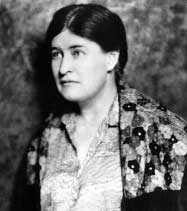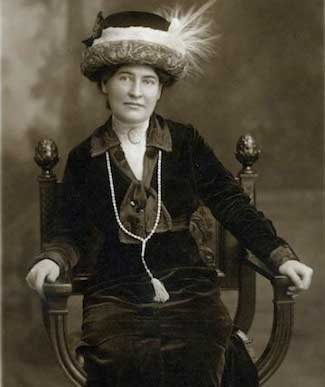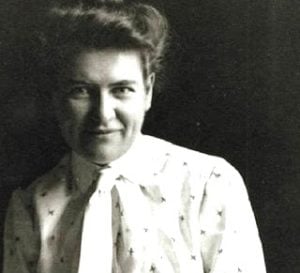Willa Cather’s Love/Hate Relationship with Fame
By Nava Atlas | On August 3, 2017 | Updated June 28, 2025 | Comments (0)

Willa Cather’s love/hate relationship with fame and the press was fierce. She courted fame in her youth, but expressed discomfort with it once it arrived.
Yet Cather left a wealth of public pronouncements, derived mainly from interviews she granted and speeches she made. She also wrote many autobiographical sketches, press releases, and even furtive semi-reviews in the third person as a way to promote her work.
Still, the more known she became, the more irritable she grew with loss of privacy.
For someone as ambivalent about publicity as Cather claimed to be, she granted tons of interviews. Judging by the vigor of her responses, she seemed to relish holding forth on the subject dearest to her heart—her writings.
While laboring in obscurity, many writers today dream of guesting on podcasts, granting press interviews, going on author tours, and appearing on visual media. If and when any part of this reverie becomes a reality, these fame-themed flights of fancy can morph into sheer panic. “Me, a public person? That’s not what I signed up for!”
Mixed signals to readers and the press
For one who claimed to treasure her privacy, she gave dozens of speeches, many of which were transcribed for posterity. “In this country a writer has to hide and lie and almost steal in order to get time to work—and peace of mind to work with,” she said in a 1926 interview. But of course, few writers really had (or have) this “problem” — and might have craved that kind of attention Cather was spurning.
If the phrase had been invented in the era of her heyday (in which the only forms of promotion available to authors were print media and lecturing), Cather would have been the model of a media-savvy author.
. . . . . . . . . .

5 Pieces of Writing Wisdom from Willa Cather
. . . . . . . . . .
More than ever, publishers want authors who can spring into actions as fully formed media mavens. And that no longer means knowing a few local newspaper reporters or having a friend of a friend at Vogue.
Publishers love authors who come with a solid “platform,” which may include tons of fans and followers in the social media world, a popular blog, video channel, or podcast, and who are schooled in the techniques of networking in this virtual realm.
Imagining a modern Cather
I can almost imagine Willa Cather being interviewed by book-loving Oprah Winfrey, these two dynamic women having a stimulating conversation about the former’s more controversial views (“Sometimes I wonder why God ever trusts talent in the hands of women,” she proclaimed crankily in 1895, “they usually make such an infernal mess out of it.”).
At one point, while working on her next-to-last novel, Lucy Gayheart, Cather felt so besieged by the press, public, and Hollywood, that she shut her phone shut off during work hours and hired a secretary to pen impersonal responses to the many letters she received.
. . . . . . . . . .
On the Art of Fiction, According to Willa Cather
. . . . . . . . .
Fame is always a mixed blessing
To gain recognition for your work is a blessing. To achieve fame is a mixed blessing. Before you start wishing for fame, find a way to test how well you handle recognition.
It’s not as easy as the fantasy version, to be sure, but it can be fun if you’re able to muster grace under pressure.
. . . . . . . . . . . .


Leave a Reply